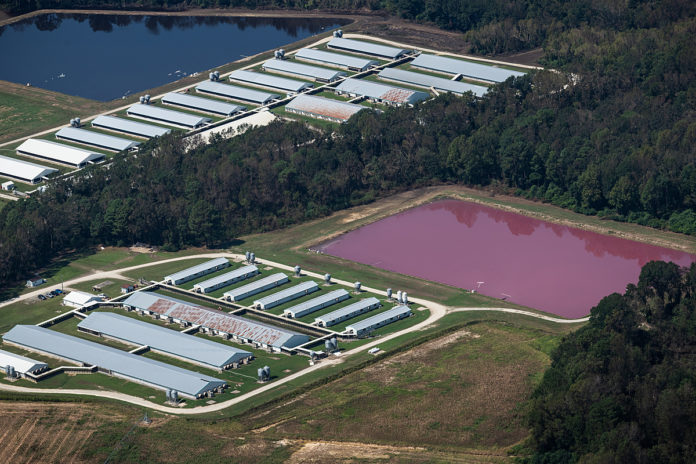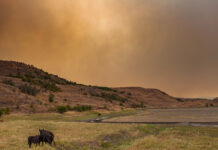
A Mercer professor’s research has sparked awareness and further investigation into the environmental impacts of animal agriculture. Most recently, the collective findings of Dr. Vasile Stănescu and other researchers were used for an article in The New York Times.
An associate professor and chair of the Department of Communication Studies and Theatre, Dr. Stănescu’s training is in rhetoric. He studies the way people talk about animals and the natural world and often focuses on health and food studies.
“My interest isn’t in figuring out the environmental footprint of the item itself; it’s how we talk about it, how we report it, and how the media covers it,” Dr. Stănescu said. “I’ve looked at invasive species populations, local meat, locavorism, climate change, and what I’m working on now is conversations around in vitro meat.”
In 2019, Dr. Stănescu published a chapter in the book Climate Change Denial and Public Relations, edited by Dr. Núria Almiron of Universitat Pompeu Fabra in Spain. Titled “Cowgate,” it was the first peer-reviewed publication to claim that Dr. Frank Mitloehner, a professor of animal science at the University of California, Davis, was misinterpreting the environmental effects of factory farms.

In 2006, the United Nations released a report called “Livestock’s Long Shadow,” which made news around the world and led to calls for changes in the way animals are raised and consumed, Dr. Stănescu said. Among its many findings, one claim was particularly shocking: The total number of greenhouse gas emissions from animal agriculture, 18%, was larger than emissions from transportation, 14%.
Dr. Mitloehner responded to the report with an article that argued the UN report was wrong, not because it had overcounted the amount of carbon released by animal agriculture, but because it had undercounted the emission by the transportation industry. In particular, the UN report had not included the whole life cycle analysis of the transportation industry, which evaluates the full environmental impact of a product from extraction to final disposal. Dr. Mitloehner’s response made it appear that factory farms do not pollute as much as they actually do, Dr. Stănescu said.
“That was a good critique from him, but he proceeded to take this study and critique and go on media and wildly misrepresent his own research,” he said.
Dr. Stănescu’s chapter has since inspired additional research by other professors and agencies. Dr. Jennifer Jacquet and her team at New York University have been working on a follow-up, peer-reviewed article on the same topic.
They are looking at the “broader industry-wide movement from factory farms of skewing public discourse about environmental effects of factory farms to hide how bad it really was on the environment,” Dr. Stănescu said. In addition, Dr. Jacquet wrote an op-ed for The Washington Post titled “The meat industry is doing exactly what Big Oil does to fight climate action.”
“Dr. Stănescu demonstrated how eager the mainstream media was to cover ‘a challenge’ to the UN report that assessed livestock’s contributions to climate change,” Dr. Jacquet said. “Stănescu’s chapter showed how effective these industry-funded challenges to mainstream scientific assessments can be, and also showed how complicit the media is — not a single reporter mentioned Mitloehner’s industry funding.”
The research by Dr. Stănescu and NYU has caught the attention of a variety of nonprofit organizations, including DeSmog and Greenpeace, spurring them to launch their own research projects. Greenpeace did a deep-dive investigation into Dr. Mitloehner and documented funding he received from the factory farm industry.
In October, this collective research was used in a New York Times article about Dr. Mitloehner titled “He’s an Outspoken Defender of Meat. Industry Funds His Research, Files Show.” Dr. Jacquet also cited Dr. Stănescu’s work in her 2022 book The Playbook: How to Deny Science, Sell Lies, and Make a Killing in the Corporate World.
“My article, Dr. Jacquet’s and her research team’s scholarship, work from various nonprofits, and other researchers who got interested in the topic led to the full article in The New York Times about Frank Mitloehner and his research,” Dr. Stănescu said. “I never expected this type of response. I was very pleased to see how the argument caught on with others.”
Tactics of data misinterpretation or misrepresentation are not new. The tobacco industry used this strategy to downplay the health risks of cigarettes and the petroleum industry to de-emphasize oil’s impact on climate change, he said.
“Dr. Stănescu’s research on Dr. Frank Mitloehner shows how the animal agribusiness is literally copying the successful strategies earlier used by the tobacco and the oil industry to delay public awareness and policy action toward key issues,” Dr. Almiron said. “In this case, what is delayed is the public recognition of the impact of animal agribusiness on the environment. The tactics used are mostly based on sowing doubt on the impact of animal agriculture with a narrative framed under a scientific facade. Dr. Stănescu’s work unveils the key role of Dr. Frank Mitloehner in the building of this narrative.”
Dr. Stănescu said he’ll be able to use “Cowgate” and the subsequent research as a real-life example for his students during his environmental communication class next year.
“These rhetorical tactics hide what’s really going on in the industry,” Dr. Stănescu said. “That’s what’s happening with the factory farms. They’re using these same tactics as the petroleum and the tobacco industry to confuse people as far as their environmental effects. I’d like our conversations to go back to that UN report and realize that 18% (of greenhouse gas emissions from animal agriculture) is still a large number. When we have numbers about climate change, we need to take seriously the effects of animal agriculture.”








